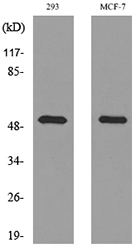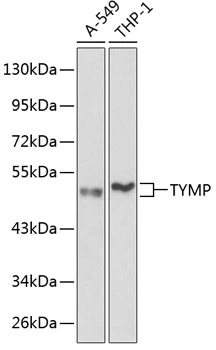![IHC-P analysis of human placenta tissue using GTX35110 Thymidine Phosphorylase antibody [SPM322]. IHC-P analysis of human placenta tissue using GTX35110 Thymidine Phosphorylase antibody [SPM322].](https://www.genetex.com/upload/website/prouct_img/normal/GTX35110/GTX35110_20200115_IHC-P_999_w_23060801_914.webp)
IHC-P analysis of human placenta tissue using GTX35110 Thymidine Phosphorylase antibody [SPM322].
Thymidine Phosphorylase antibody [SPM322]
GTX35110
ApplicationsImmunoPrecipitation, Western Blot, ImmunoHistoChemistry, ImmunoHistoChemistry Paraffin
Product group Antibodies
ReactivityHuman, Mouse, Rat
TargetTYMP
Overview
- SupplierGeneTex
- Product NameThymidine Phosphorylase antibody [SPM322]
- Delivery Days Customer9
- Application Supplier NoteWB: 1-2microg/ml. IHC-P: 1-2microg/ml for 30 minutes at RT. IP: 0.5-1microg/500ug protein lysate. *Optimal dilutions/concentrations should be determined by the researcher.Not tested in other applications.
- ApplicationsImmunoPrecipitation, Western Blot, ImmunoHistoChemistry, ImmunoHistoChemistry Paraffin
- CertificationResearch Use Only
- ClonalityMonoclonal
- Clone IDSPM322
- Concentration0.2 mg/ml
- ConjugateUnconjugated
- Gene ID1890
- Target nameTYMP
- Target descriptionthymidine phosphorylase
- Target synonymsECGF, ECGF1, MEDPS1, MNGIE, MTDPS1, PDECGF, TP, hPD-ECGF, thymidine phosphorylase, gliostatin, tdRPase
- HostMouse
- IsotypeIgG1
- Protein IDP19971
- Protein NameThymidine phosphorylase
- Scientific DescriptionThis gene encodes an angiogenic factor which promotes angiogenesis in vivo and stimulates the in vitro growth of a variety of endothelial cells. It has a highly restricted target cell specificity acting only on endothelial cells. Mutations in this gene have been associated with mitochondrial neurogastrointestinal encephalomyopathy. Multiple alternatively spliced transcript variants have been identified. [provided by RefSeq, Apr 2012]
- ReactivityHuman, Mouse, Rat
- Storage Instruction-20°C or -80°C,2°C to 8°C
- UNSPSC12352203




